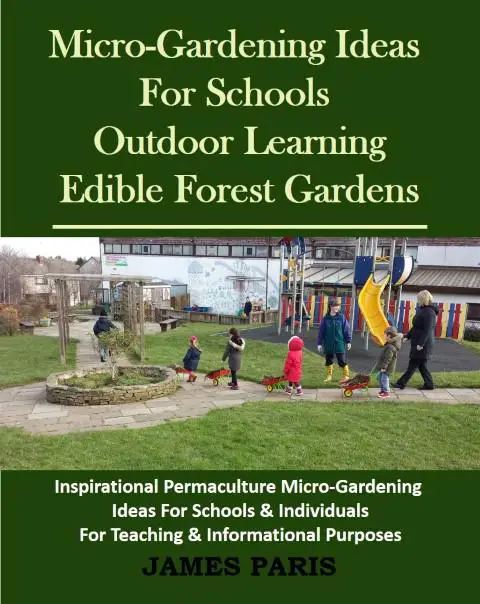Teaching young kids to grow vegetables is not only a lot of fun, but it is a great way to introduce them to the practicalities of life.
The vegetables on the store shelf did not just ‘appear’ as if by magic – somebody actually had to plant the seed, care for the plants as they grew, then harvest and bring them to the supermarket shelf – a LOT of kids just don’t know this basic fact.
Studies have shown  that working any kind of garden is highly educational and invaluable for the child’s development both in a physical and mental way as they absorb the many lessons associated with planting seeds and watching them grow.
that working any kind of garden is highly educational and invaluable for the child’s development both in a physical and mental way as they absorb the many lessons associated with planting seeds and watching them grow.
Recently I was asked by a local children’s nursery school in Midlothian to help them with a Straw Bale Garden arrangement they had planned for their small play area, and of course I was more than happy to oblige!
You will see in some of the pictures below that the kids were very successful in growing a number of vegetables very successfully – which they later turned into soups and other quick foods with the class teacher, or took home proudly to their parents.
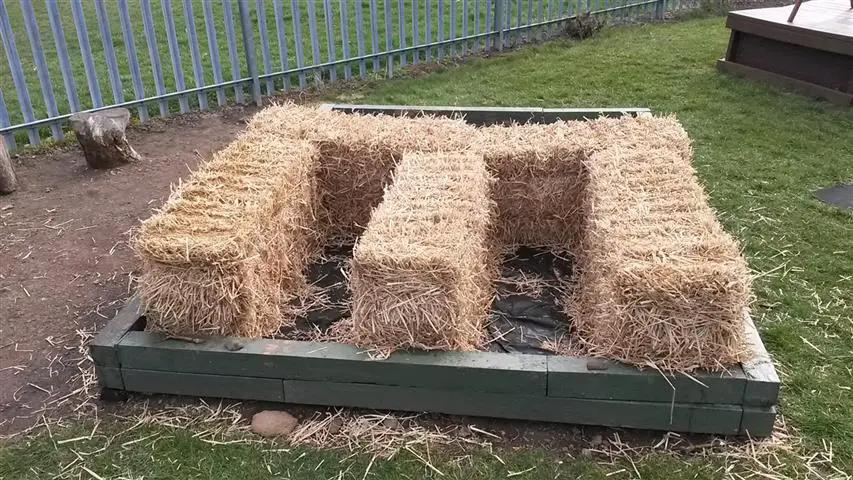
In fact one of the unforeseen benefits was that some of the kids were so enthused with growing their own veggies it rubbed off on their parents – some of whom have since started their own veggie gardens.
The Benefits Of Gardening For Children
Gardening with kids has many benefits relating to their development, and is not simply a way to introduce young children to the joys of working outdoors with your ‘bare hands’ and experiencing many practical life skills. In fact – many life skills and lessons such as…
- Honing their large and fine motor skills – Developing spatial awareness, core strength, co-ordination and other vital physical skills.
- Social Emotional & Behavioural – Learning to follow instructions to keep safe, self-confidence and responsibility, exploration and curiosity.
- Speech & Language – Learning to communicate and ask questions, learning about times and seasons, learn to use well-formed sentences, the use of proper grammar to express themselves.
- Cognitive Development – Learning how to deal with emotions and caring about what other people may think. Learning to communicate needs, likes and dislikes.
On top of these recognised developmental skills, the kids also learn about the importance of timing, and the seasons for planting and also harvesting their vegetables.
Nutritional benefits of growing fresh food is another valuable lesson, as is the importance of care and nurture of another living thing.
Numeracy is another important skill nursery children soon learn. How many onions can I plant in a straw bale garden. How many seeds to a row or how many cabbages to grow in a certain area.
Practical every-day things that adults take for granted like what’s it like to get your hands wet and dirty, to plant a seedling, or to smell that tomato plant – or your fingers after you have rubbed a leaf.
Planning and organizational skills are developed as they plant a seed or seedling and then be patient to watch it grow into maturity.
Learning to understand the environment and indeed care for it in a responsible way.
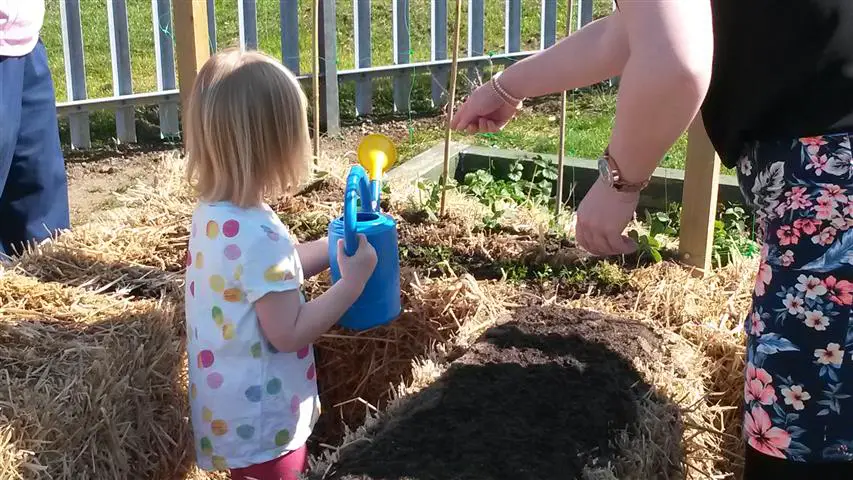
Why are plants green and why do some of them die away in winter – only to return again in spring? These are all questions that we as adults take for granted but as a child they are all questions that need answers as their spatial awareness grows and they absorb all this new and exciting information.
Planting A Garden With Preschoolers
The first thing to get to grips with when planning a vegetable garden for nursery kids, is remember they are kids! Basic I know, but sometimes it’s easy for adults to forget this simple lesson.
With this in mind it is best to look into no-dig options such as Straw Bale gardening or Raised bed gardens. What is a no-dig garden? Well there is a fuller explanation on this page, however in a nutshell, it is a way of gardening that does not require heavy equipment such as machinery or heavy garden spades etc – and is there-fore well suited for a nursery garden.
however in a nutshell, it is a way of gardening that does not require heavy equipment such as machinery or heavy garden spades etc – and is there-fore well suited for a nursery garden.
The Straw Bale method is an ideal example of this as not only is there no mucky soil involved, it is at an ideal hight for the children to work at.
is an ideal example of this as not only is there no mucky soil involved, it is at an ideal hight for the children to work at.
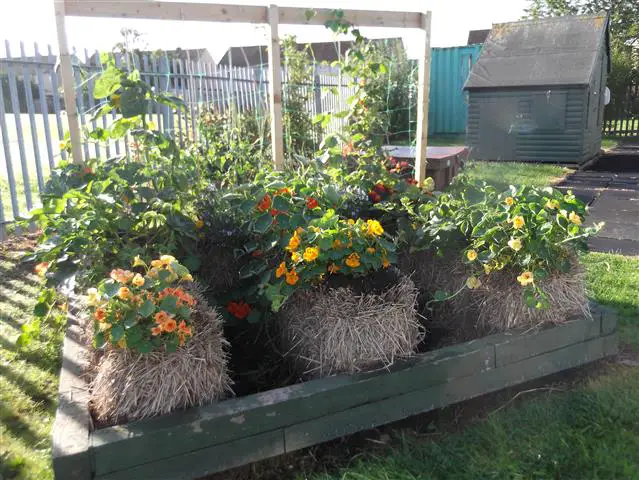
For the kids, everything is at virtual eye level and accessible to them. With our own nursery school garden we chose straw bales just for that reason – and the fact that it piqued the curiosity of the parents who were regular visitors!
Easy veggies To Grow With Kids
If the main objective here is to keep the kids interested enough so they can develop all the skills listed above, then it is of paramount importance to be sure and pick the right kind of vegetables that will suit your area, and that are fairly easy to grow.
Although it is true that even dead and dying plants can teach valuable lessons – it’s much better to try and grow easy vegetables to maturity and subsequent harvest time!
With that goal in mind here are some easy to grow veggies your kids will love planting.
- Pea and bean plants
- Lettuce and cabbages
- Zucchini and cucumber
- Radish and small turnips
- Tomatoes

- Microgreens
- Onions
 and shallots
and shallots
You will see that in the straw bale garden example in the pictures, I have added a simple framework to the back of the bales. This gives excellent support to any climbing plants like peas, beans, cucumber etc that you can grow with the kids.
Finally in support of the Straw bale system, the picture below shows the kids taking the straw bales away to be composted after they have grown 2 years worth of vegetables from them – they thoroughly enjoyed the ‘grand day out’ with the wheelbarrows 🙂

The Downside Of A Straw Bale Garden
The downside of the straw bale method I have to admit, is that you have to prepare the straw bales in a process called ‘conditioning’ or ‘priming’. Whilst this is not complicated, it does add another level to the whole gardening experience, and indeed another lesson for the children?
The full instructions for conditioning a Straw Bale can be found here , however it basically consists of watering and feeding the bale with a rich nitrogen feed for a few weeks before you start planting it out.
, however it basically consists of watering and feeding the bale with a rich nitrogen feed for a few weeks before you start planting it out.
In the school where this garden was laid out, the nursery teacher was very keen to learn this process so it was a more positive experience all round for the teacher and the kids.
Raised Bed Gardening For Kids
The Raised Bed is an ever-popular way to grow vegetables, owning to its easy of use and productivity in general.
This nursery had a very simple Raised Bed area where I showed them how to plant potatoes and onions which the teacher later made into a hot soup for the kids.
and onions which the teacher later made into a hot soup for the kids.

Although they had a shallow Raised Bed made with timber only 6 inches deep (but placed on a topsoil garden). It is a simple matter to build a raised bed say 18” deep (which is a good height for the kids) and grow deep rooted veg like carrots and parsnips which are easy to grow in the special no-dig compost
say 18” deep (which is a good height for the kids) and grow deep rooted veg like carrots and parsnips which are easy to grow in the special no-dig compost material that forms a proper growing medium.
material that forms a proper growing medium.
Another type of Raised Bed garden is also known as ‘Square Foot’ or ‘Grid Gardening’, and is another no-dig technique that is easy to do and the kids will love it for the easily manageable 4 foot square size.
It also helps a lot with their numbers as the grids are set out to accomodate a certain amount of plants per square depending on the size of the plant or seeds.
depending on the size of the plant or seeds.
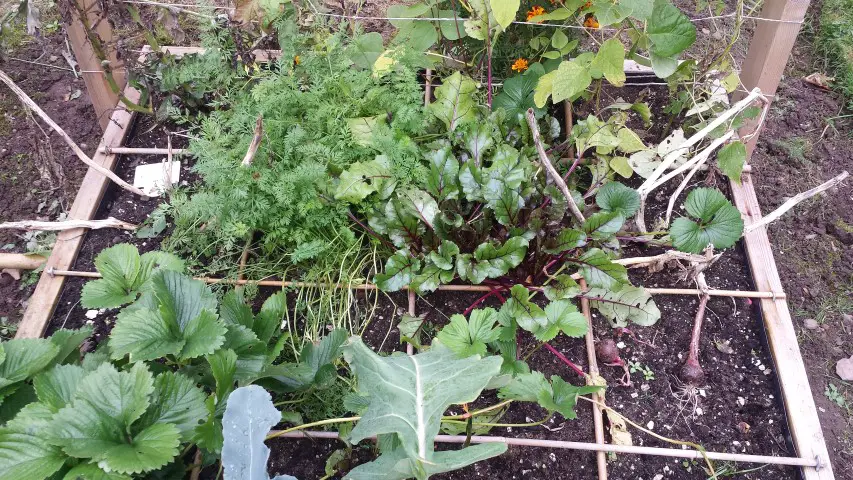
The really interesting thing about letting the kid’s plant and nurture their own vegetable garden? The parents could not believe how many of the kids who “hated” vegetables suddenly discovered they loved them!
So whether you are planning to grow veggies with the local nursery kids, or your very own preschool kids, there is no doubt that the whole experience for both adults and children can be both fruitful and highly educational on many levels.

